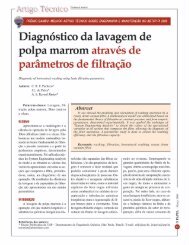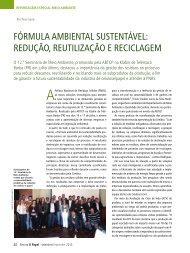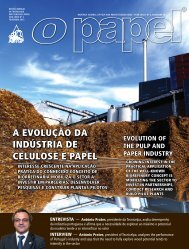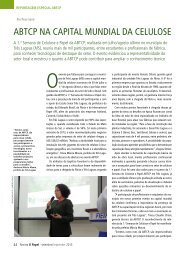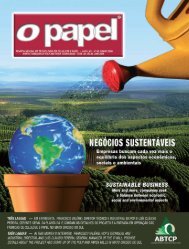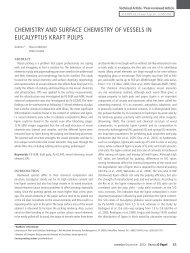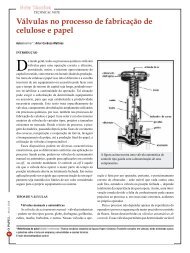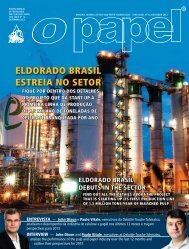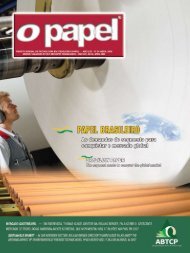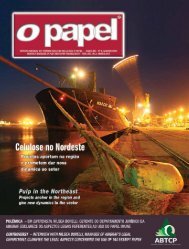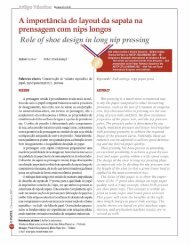CADERNO BRACELPAO PAPEL - Junho 201018Colu<strong>na</strong> BracelpaBracelpa ColumnThe challenges of a lowcarbon economyThe forest base industry offerssociety environmentally friendly solutionsand recyclable products thatensure the sustai<strong>na</strong>ble development ofthe global economy. Additio<strong>na</strong>lly, itcontributes to mitigate climate changeand reduce CO 2emissions in theatmosphere. A “green future” for theplanet is not a matter that only relatesto non-governmental organizationsand environmentalists; it is also a toppriority of this industry’s agenda.The above statements summarizethe main opinions at the annual Inter<strong>na</strong>tio<strong>na</strong>lCouncil of Forest and PaperAssociations (ICFPA) meeting, andthe 51 st Session of the Advisory Committeeon Paper and Wood Products(ACPWP) held by the United NationsFood and Agriculture Organization(FAO), which events Bracelpa attendedin late May, in Tokyo, Japan.Representatives of associationsfrom the main countries that partake inthe global forest base market a<strong>na</strong>lyzedthese issues, exchanged experiencesand discussed business strategies focusingmainly on the Convention onClimate Change (COP16), scheduledto take place in November, in Mexico.During the meeting, emphasiswas placed on Brazil’s role and that ofplanted forests in the sector regardingCO 2absorption, as well as on the developmentof a low carbon economy,which is already changing inter<strong>na</strong>tio<strong>na</strong>ltrade relations. It was also stressed thatBy Elizabeth de Carvalhaes,the executive president of the BrazilianPulp and Paper Industry (Bracelpa).E-mail: faleconosco@bracelpa.org.brthe rapid growth of planted forestsand the high rate of carbon absorptionin combating global warming are themain arguments of Brazil’s pulp andpaper sector in climate negotiations.We expounded that the objective is toconquer the validity of forest carboncredits as a mechanism for offsettingemissions, which proposal will beplaced by Brazil’s government on theCOP16 negotiation table.Planted forests were also recognizedby Michael Peter, executive directorof Forestry South Africa, the mainforest entity in that country: “Wood isa recyclable and renewable materialand its lifecycle does not end when itis cut. As such, it is necessary to showthat the end products and also the newplanted forest areas continue to stockcarbon”, said the executive.In terms of forest base, discussionsshowed that the main challenge of entities,and companies associated to them,is to change the common perceptionthat forests “will shrink” if used. In thissense, it is necessary to center effortson showing that the opposite is whatactually occurs. That is, the more woodproducts consumers buy that origi<strong>na</strong>tefrom sustai<strong>na</strong>ble forestry, the morethey will be contributing to maintainthe forest base in development, throughnew investments and new mills.Population growth and the needto mitigate climate change once againreinforced the importance of the forestindustry worldwide. Sustai<strong>na</strong>ble ma<strong>na</strong>gementis a prerequisite in pursuingfuture global demand for products andservices, while building a low carboneconomy. This issue again placesthe pulp and paper industry in thecenter of debates. “New policies willinfluence industrial development and,for such, the partnership between theprivate sector and FAO will be crucial”,asseverated Teresa Presas, ICFPA’spresident.The forest base industry is reactingpositively to the challenges of change,and it will have a great opportunity toshow its value in 2011, when the UnitedNations Inter<strong>na</strong>tio<strong>na</strong>l Year of Forestswill occur.We need to prepare ourselves forthis event and show Brazil and theworld the role of forests – particularlyplanted forests – in this newsce<strong>na</strong>rio of pursuing a low carboneconomy, which will mark the futureof next generations.<strong>Revista</strong> O <strong>Papel</strong> <strong>na</strong> InternetComeça a ser construído umconteúdo além das pági<strong>na</strong>simpressas para oferecer muitomais aos leitores! Acesse:www.revistaopapel.org.br
Reportagem BracelpaPolítica Nacio<strong>na</strong>l de Resíduos Sólidostraz oportunidades para o setorAprovada pela Câmara dosDeputados em 10 de marçode 2010, depois de 19 anosem pauta, a Política Nacio<strong>na</strong>l de ResíduosSólidos (PNRS) busca alinharinteresses dos mais diversos setoresda economia. Nesse período, váriosprojetos foram incorporados ao textofi<strong>na</strong>l, uma vez que 148 propostas versavamsobre o assunto e era precisoum projeto de lei único para fortalecera iniciativa. A Associação <strong>Brasil</strong>eirade Celulose e <strong>Papel</strong> (Bracelpa) participouativamente da formulaçãodos pontos relacio<strong>na</strong>dos ao setor,fornecendo informações, avaliandopropostas e sugerindo alter<strong>na</strong>tivasquando necessárias.“Tenho aprendido muito nessaconvivência com a Associação e asempresas. Na minha avaliação, hávárias oportunidades para o setor decelulose e papel fortalecer boas práticase consolidar sistemas de produçãoe processos já existentes”, afirmao deputado federal Ar<strong>na</strong>ldo Jardim(PPS/SP), que coordenou o grupode trabalho de Resíduos Sólidos responsávelpela elaboração do projetode lei, que até o fechamento destaedição tramitava no Se<strong>na</strong>do. “A prioridadeda PNRS é não gerar resíduos.Aqueles que ainda não perceberam aimportância e os impactos positivosda medida serão convencidos porconta das demandas do seu negócio”,completa o parlamentar.Para discutir o tema com as empresasassociadas, a Bracelpa promoveuem São Paulo, no início de junho, umdebate com a presença de Jardim. Elelembrou que a PNRS não consisteem um texto isolado, mas integra aPolítica Nacio<strong>na</strong>l do Meio Ambientee articula-se com a Política Nacio<strong>na</strong>lde Educação Ambiental, algo que seráfundamental para sua aplicação.Ele destacou como pontos positivosa responsabilidade compartilhadapela desti<strong>na</strong>ção dos resíduos sólidos,Principais pontos da Política Nacio<strong>na</strong>l de Resíduos Sólidos• Responsabilidade compartilhada pelo ciclo de vida dos produtos – Conjunto de atribuiçõesindividualizadas e encadeadas dos fabricantes, importadores, distribuidorese comerciantes, dos consumidores e dos titulares dos serviços públicos de limpezaurba<strong>na</strong> e manejo dos resíduos sólidos pela minimização do volume de resíduos sólidose rejeitos gerados, bem como pela redução dos impactos causados à saúde huma<strong>na</strong> eà qualidade ambiental decorrentes do ciclo de vida dos produtos, nos termos da PNRS;• Acordos setoriais – Atos de <strong>na</strong>tureza contratual firmados entre o poder público e fabricantes,importadores, distribuidores ou comerciantes, tendo em vista a implantaçãoda responsabilidade compartilhada pelo ciclo de vida do produto;• Ciclo de vida do produto – Série de etapas que envolvem o desenvolvimento doproduto, a obtenção de matérias-primas e insumos, o processo produtivo, o consumoe a disposição fi<strong>na</strong>l;• Desti<strong>na</strong>ção fi<strong>na</strong>l – Desti<strong>na</strong>ção ambientalmente adequada de resíduos que inclui a reutilização,a reciclagem, a compostagem, a recuperação e o aproveitamento energéticoou outras desti<strong>na</strong>ções admitidas pelos órgãos competentes. O objetivo é evitar danosou riscos à saúde pública e à segurança, e minimizar impactos ambientais adversos;• Gerenciamento de resíduos sólidos – Conjunto de ações exercidas, direta ou indiretamente,<strong>na</strong>s etapas de coleta, transporte, transbordo, tratamento e desti<strong>na</strong>ção fi<strong>na</strong>lambientalmente adequada dos resíduos sólidos, e disposição fi<strong>na</strong>l ambientalmenteadequada dos rejeitos, de acordo com planos municipais de gestão integrada deresíduos sólidos ou com planos exigidos <strong>na</strong> forma da PNRS;• Gestão integrada de resíduos sólidos – Conjunto de ações voltadas à busca de soluções paraos resíduos sólidos, de forma a considerar as dimensões política, econômica, ambiental,cultural e social, com controle social e sob a premissa do desenvolvimento sustentável;• Logística reversa – Instrumento de desenvolvimento econômico e social, caracterizadopor um conjunto de ações, procedimentos e meios desti<strong>na</strong>dos a viabilizar a coleta e arestituição dos resíduos sólidos ao setor empresarial, para reaproveitamento, em seuciclo ou em outros ciclos produtivos, ou outra desti<strong>na</strong>ção fi<strong>na</strong>l ambientalmente adequada;• Reciclagem – Processo de transformação dos resíduos sólidos que envolve a alteraçãode suas propriedades físicas, físico-químicas ou biológicas, com vistas à transformaçãoem insumos ou novos produtos, observadas as condições e os padrões estabelecidospelos órgãos competentes.O PAPEL - - Abril Junho 2006 201019CADERNO BRACELPA
- Page 2 and 3: Quanto mais tecnologia,mais economi
- Page 4 and 5: 4O PAPEL - Junho 2010Artigo Gestão
- Page 6 and 7: Sumário SummaryBANCO DE IMAGENS AB
- Page 8: EditorialEditorialBanco de Imagens
- Page 11 and 12: cooperativos de ajuda mútua orien-
- Page 13: up in following one’s dream is a
- Page 16 and 17: Adora futebol,automóveis antigos e
- Page 20: CADERNO BRACELPAa logística revers
- Page 23 and 24: companies, Bracelpa promoted in Sã
- Page 25 and 26: Setor EconômicoEconomic sectorCres
- Page 27 and 28: Administração Eficaz&Competitivid
- Page 29 and 30: de vida em que a gestão da nossa v
- Page 31 and 32: Coluna ABPO ABPO ColumnSemestre fav
- Page 33 and 34: Artigo ABPOABPO ArticleRuptura nos
- Page 35: Adespeito de qualquer previsãoapoc
- Page 38 and 39: O PAPEL - Junho 201038Um bom exempl
- Page 40 and 41: Conhecimento essencialpara papel e
- Page 42 and 43: Voith Paper na PulPaper e Zellchemi
- Page 44 and 45: O PAPEL - Junho 2010O PAPEL vol. 71
- Page 46 and 47: O PAPEL vol. 71, num. 6, pp. 43 - 5
- Page 48 and 49: Tabela 3. Condições de branqueame
- Page 50 and 51: Tabela 6. Resultados teste de Tukey
- Page 52 and 53: Tabela 7. Médias do índice de tra
- Page 54 and 55: Referências / ReferencesO PAPEL vo
- Page 57 and 58: Artigo TécnicoPEER-REVIEWED ARTICL
- Page 59 and 60: pode induzir inesperadamente a alta
- Page 61 and 62: mado que o uso de Na 2S 2O 3·5H 2O
- Page 63 and 64: 2, 3, 4 e 9 podem também acontecer
- Page 65 and 66: alta do superaquecedor, no banco ge
- Page 67 and 68: Figura 4. Imagem por microscópio
- Page 69 and 70:
Apêndice 1. Exemplo de composiçõ
- Page 71 and 72:
19. Malkow T. , Mäkipää M.I., Un
- Page 73:
Este anúncio é para lembrar que o
- Page 76 and 77:
ABTCP - Associação Brasileira Té
- Page 78 and 79:
O PAPEL - Junho 201078lação a de
- Page 80 and 81:
O PAPEL - Junho 201080Miolo(R$ por
- Page 82 and 83:
DiretoriaBoard of DirectorsO PAPEL
- Page 84:
Procurando as melhores oportunidade



